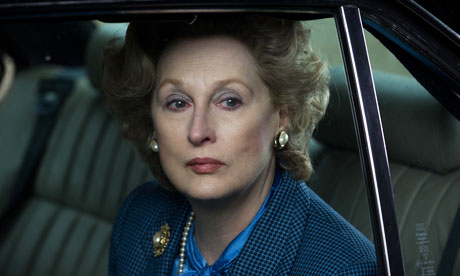Among the many monikers that could be applied to film in 2011, perhaps the "Year of the Mediocre Biopic" should be considered among the more apt. First came "J. Edgar", the latest middling effort from Clint Eastwood spanning the life of FBI director Hoover. Next was Simon Curtis's "My Week with Marilyn", a more focused but still distant glimpse into the world of Marilyn Monroe. Now comes "The Iron Lady", slipping in just under the end-of-the-year wire as another mostly forgettable biography.
 |
| Meryl Streep as Magaret Thatcher in The Iron Lady |
 After milking Thatcher's humble beginnings for some audience relatability, the film begins to jump between the present and the past, juxtaposing her past triumphs with her contemporary decline. The movie bounces through major events in the woman's life rapidly; we witness her political campaigning, parliamentary debates, and scattered experiences as Prime Minister in a series of efficient recollections. The events chosen to be featured by the screenplay feel almost as if they were hand picked out of a hat, particularly incidents of historical significance, which are displayed with no context and little weight.
After milking Thatcher's humble beginnings for some audience relatability, the film begins to jump between the present and the past, juxtaposing her past triumphs with her contemporary decline. The movie bounces through major events in the woman's life rapidly; we witness her political campaigning, parliamentary debates, and scattered experiences as Prime Minister in a series of efficient recollections. The events chosen to be featured by the screenplay feel almost as if they were hand picked out of a hat, particularly incidents of historical significance, which are displayed with no context and little weight.
This structure is the movie's primary fault: it is a downright mess. The screenplay doesn't allow viewers to experience a coherent picture of Thatcher's life. "The Iron Lady" is filled with snippets -- tiny morsels of character development lacking in impact or credence. The only lucid portrait of Thatcher that we see is that of her in the modern day, but this is not the Thatcher that is interesting. Rather than featuring this fearsome stateswoman at the top of her game, the film is dominated by the elderly version's present interaction with her hallucinatory husband, a repetitious and unimportant exercise. I wanted to see more of this iron lady in her prime.
Streep's performance deserves mention, as it is typically strong. Streep empowers Thatcher with spirit and poise. She allows us to sense the inner guile of this woman, though we never see this strength fully-realized in the events of the film. It is an overpowering performance diminished by the deficiencies of the movie's script and direction. Rather than allow the performance to create a natural depiction of the character through acting and dialogue, the director feels the need to inject artificial excitement into the film through the use of frenetic editing, abnormal camera movement, and staged set pieces. In combination with the poor screenplay, these directorial choices prevent Thatcher's essence from being displayed on the screen in a meaningful fashion. All this adds up to a fine performance without a fine film to showcase it.
Did you enjoy this review? Click here for more reviews from Nolan!
Tweet .




















